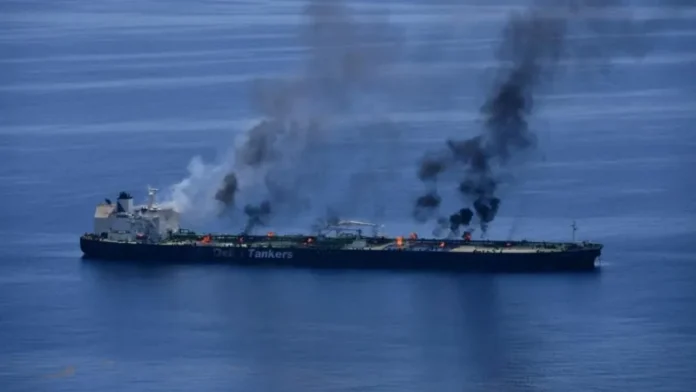The Greek-owned oil tanker MV Sounion, which was attacked by Yemen’s Houthi rebels in the Red Sea last week, remains engulfed in flames and may be leaking oil, according to a statement from the US Pentagon.
The situation is raising concerns about a potential catastrophic oil spill that could dwarf previous maritime disasters.
The Sounion, carrying over 150,000 tonnes—equivalent to one million barrels—of crude oil, was first attacked by Houthi forces on Wednesday.
The assault began with gunfire from two small boats, followed by three unidentified projectiles that struck the vessel, igniting a fire and disabling its engines.
The UK Maritime Trade Operations (UKMTO) reported that the ship’s 25 crew members were rescued by a European warship the following day and safely transported to Djibouti.
Despite attempts to salvage the stricken tanker, efforts have been obstructed by the Houthi rebels, who have also threatened further attacks.
On Saturday, the US State Department issued a warning about the potential environmental consequences of the incident, noting that an oil spill from the Sounion could be four times the size of the Exxon Valdez disaster of 1989, which spilled 257,000 barrels of oil off the coast of Alaska.
The Houthi rebels, who are backed by Iran and control much of Yemen, claim that their attacks are part of their broader support for Palestinians in the ongoing conflict between Israel and Hamas in Gaza.
Over the past 10 months, they have targeted ships in the Red Sea, reportedly sinking two vessels and killing at least two crew members.
Although the Houthis have frequently claimed that their assaults are aimed at vessels linked to Israel, the US, or the UK, these assertions have often proven false.
The situation with the Sounion remains critical. Pentagon spokesperson Maj-Gen Patrick Ryder confirmed on Tuesday that two salvage tugs had been dispatched to the area, but the Houthis have threatened to target these rescue efforts as well.
“We are working closely with regional partners to assess and mitigate any potential environmental impact,” Ryder said.
The US government expressed concern about the broader implications of the escalating attacks, warning that the Houthis’ actions in the Red Sea pose a significant risk to international shipping and regional stability.
The prospect of a massive oil spill in the heavily trafficked Red Sea could have far-reaching consequences, threatening marine life, coastal ecosystems, and the livelihoods of millions in the region.
As the Sounion continues to burn, the focus remains on preventing a disaster that could rival some of the worst oil spills in history. However, with the Houthis threatening further action, the situation remains volatile.

